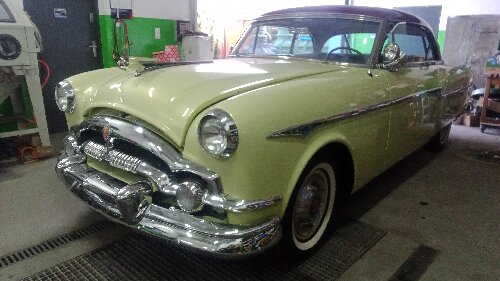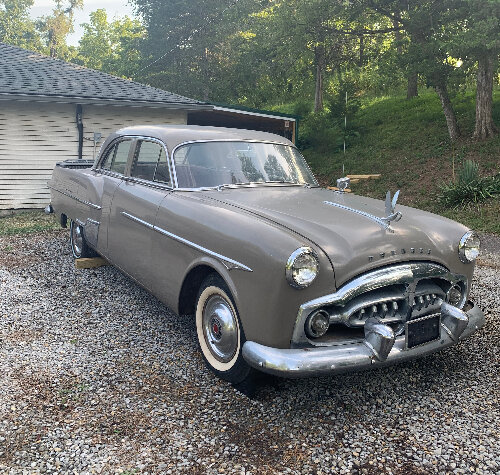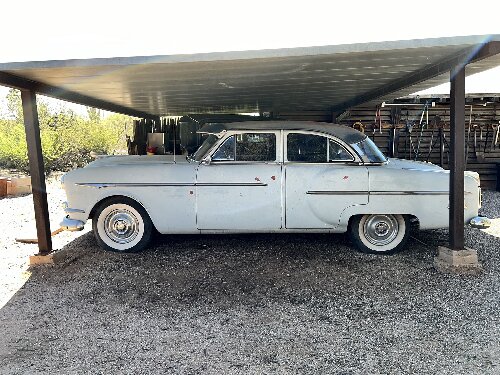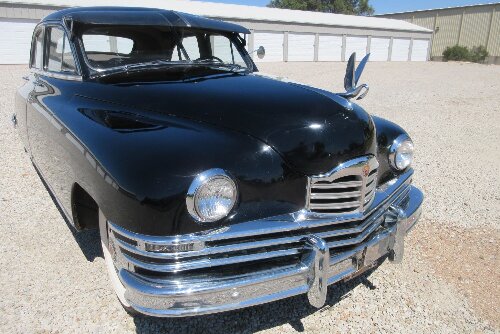|
Re: Ask the man who owns one
|
||||
|---|---|---|---|---|
|
Home away from home
|
I do not know what California's licensing fees are. Here in Florida the license (tag) fee for my Mercury Grand Marguis was $97 for two years when last I had to renew the plate on it. It is my understanding that the fee is to go up by about half this year.
I was using figures from one of the commonly available inflation calculator sites on the 'net. They all seem to be pretty much comparable to each other in calculated inflation figures (I've tried five or six of them to compare the results). The most expensive place that I have ever had to tag an auto was Oklahoma in about 1977. The plate for my personal car (active duty military) only cost 19 dollars and some odd cents. I discovered the disparity betwixt this (reasonable) fee and "regular" license tag fees when I bought my wife an El Dorado and found that, alas, military dependants did not qualify for the same consideration. By the time the lady at the tag agents office got through punching numbers into her calculator, I was tired. Almost had a coronary arrest when she read me the figure. Of course it included the 7% state sales tax as well as the licensing fee but, even so, was a shock to someone who'd been licensing cars in Texas and Arkansas where the "normal" yearly cost was between about $18 and $25. If memory serves, the tag fee alone was about three times what I expected without the sales tax (which I did expect). It was, in fact, about this time that there was a major scandal in the state regarding county tag agencies and more than a couple of county commissioners wound up being sent to the penitentiary for, in effect, selling tag agencies to the highest bidder. I remember thinking to myself, at the time, "Well, I can certainly understand that."
Posted on: 2009/6/14 15:07
|
|||
|
||||
|
Re: Ask the man who owns one
|
||||
|---|---|---|---|---|
|
Home away from home
|
"The fee was $25.00 to register it in 51. Not bad for a new car."
At first glance this appears to have been a good deal - until one takes into account that it takes approximately $223.95 in 2009 dollars to buy what 25 U.S. dollars bought in 1951.
Posted on: 2009/6/14 9:33
|
|||
|
||||
|
Re: twin-ultamatic
|
||||
|---|---|---|---|---|
|
Home away from home
|
Same story as Eric's except that my '55 Pat had a '56 aluminium cased T/U when I got it. Never any trouble in hard, daily use since 2005 except for initial tendency of direct-drive clutch to slip that cleared up after a couple (or was it three) fluid changes and switching to B&M Trick Shift transmission fluid. Just as an example of the kind of daily use it gets, I've been driving it back and forth from Orlando to Palm Coast, Ormond Beach, Daytona and Port Orange on I-4 and I-95 for the past two weeks at average speeds of between 70 and 80 mph.
Like Packard V8, I'm not in any hurry to depart traffic signals or standing stops. The Ultramatic (nor almost any other automatic transmission of its day) was not designed for such and the Ultramatic (including its T/U incarnation)- in particular - will not long tolerate it. Fuel mileage would improve greatly with an OD set-up of some kind, of course, but the T/U is a smooth, serviceable and dependable transmission (for its day) if respected for what it was designed for. I know whereof I speak, being personally responsible for the early (and sometimes catastrophic) failure of at least one example of almost all known domestic '50s era automatic transmissions.
Posted on: 2009/6/9 15:23
|
|||
|
||||
|
Re: Reversed Polarity
|
||||
|---|---|---|---|---|
|
Home away from home
|
I am not positive (no pun intended) as to the actual reasoning of the manufacturers but experience tells me that Positive ground electrical systems work well when everything is new and all components ground as designed. As the vehicles get older, parts rust/corrode/get loose, etc. components tend to loose their grounds and to become either inoperable or intermittent, if you will. The negative ground system with its input and ground wiring tends, I think, to be more dependable and easier in some cases to diagnose over the long run. Today, most mechanics have never seen a Positive ground system and some tend to do strange things to them in their ignorance.
Posted on: 2009/6/1 23:10
|
|||
|
||||
|
Re: 5" Air Duct Tubes
|
||||
|---|---|---|---|---|
|
Home away from home
|
I, too, have ordered product from several of the PI Projects and have found them to be of high quality and reasonably priced. I always check the chapter projects before ordering from any of the regular commercial vendors. Don't get me wrong. I appreciate the vendors because without them parts for our cars would be scarce to unobtainable after all of these years and I appreciate the fact that many parts that the vendors offer are expensive to make in the relatively small quantities in comparison to the major marques (big three). I've been around a pretty good while and own a set of Hollander exchange manuals and have contacts at several of the local parts suppliers, often finding that many of the minor component used commonly on many marques can be had from the auto supply houses at much cheaper prices than the speciality vendors charge for them however - and again - there's overhead to be considered and the convenience of not having to search exchange manuals. I would, whilst in this vein of thought, like to especially commend Sandy Chirco at Tuscon Packard. His prices are competitive, I have never had a "wrong" part shipped to me from him and everything that I've purchased from Tucson Packard has been of the highest quality.
Posted on: 2009/6/1 22:57
|
|||
|
||||
|
Re: "1999" Packard to be auctioned on eBay May 26
|
||||
|---|---|---|---|---|
|
Home away from home
|
I rather liked the simplicity of the car when it first appeared as it seemed to me a modern attempt at the quiet elegance and lack of non-functional, extemporaneous glitz that was a staple of Packard design for most of the company's existence.
Posted on: 2009/5/23 15:03
|
|||
|
||||
|
Re: Driver Skills
|
||||
|---|---|---|---|---|
|
Home away from home
|
Driving up and down Florida's Turnpike in the '55 Pat is not so bad. The car will comfortably cruise at 80 and seems to "want" to (that zone that individual vehicles seem to have when everything seems to be working most efficiently and effortlessly). I have discovered however that my fuel economy suffers, significantly, above about 75 mph and have lately taken to driving between 65 and 75 in the right lane. Rude, inconsiderate drivers aren't in short supply here in the sunshine state but we have so many tourists and retired folks down here that drive 50 mph in the fast lane that one can often make better time driving a set speed in the right-hand (slow) lane anyway. Much of my travelling is still business related (I'm about three-guarters retired) but I try to schedule enough time (you know, leave earlier than five minutes before I'm supposed to be somewhere) not to have to be in a hurry and often will take the less-travelled two-lane state and local roads instead of the Turnpike, I4, I75 and (especially) I95 when possible and time permits.
I think Florida may be unique in that about half the people here are driving 5 to 15 mph under the speed limit and the other half are driving between 10 and 30 mph over it. After having spent most of my life driving nearly all over the world, it's my personal opinion that virtually 75% of them would be unable to obtain a driving license in most European countries and much of the rest of this country. This produces such a vast number of pissed-off drivers that one learns, early-on, to ignore them and just try to be safe and stay alive. Here, it doesn't really matter what one is driving. There are going to be significant numbers of other drivers who aren't going to like the way you're driving it, anyway.
Posted on: 2009/5/21 9:37
|
|||
|
||||
|
Re: Driver Skills
|
||||
|---|---|---|---|---|
|
Home away from home
|
I flush brakes and replace brake fluid once a year, lubricate as recommended as close to every 1000 miles as I can, especially if I've been driving in standing water, lubricate the torsion level, carefully, about once a year. I've added grease 'serts in the rear hubs so that axles do not need to be pulled to grease rear wheel bearings on the '55 (that's a 20,000 mile recommended service anyway but having done it, I thought the mod was justified), change oil and by-pass oil filter and check the differential about once every 2000 to 3000 miles, check power steering reservoir, T/U, brake fluid (I have a top-fill brake fluid reservoir) and engine oil levels at least every two weeks, check air pressure in tyres every time that I refuel and pay very close attention to the way that my car drives and "feels" when I drive it. As I use it all the time, this seems prudent to me. Usually, about once a week, I even check all exterior lighting to be sure that my brake lights, back-up lights, turn signals and license plate illumination are working. These are things that I was taught many years ago. Regularity of oil changes (I do not use synthetic oil in the Packard) had to be gotten used to again as did the necessity of lubricating front end and suspension points - something the modern driver has never had to do and is not used to.
I agree fully with PackardV8 that there is nothing any modern car will do better than my Patrician and many things that they won't do nearly as well. The room, ground clearance, torque applied to the road at the rear wheels when needed (even with the T/U), unconcern with which deep dips, road imperfections, railroad tracks, etc. can be negotiated all far surpass any cars of my experience for, at least, the past thirty years. Yes, repeated heavy use of the drum brakes will result in fade if they don't have time to cool but engine braking is good with the T/U and fade is easily compensated for when you're aware of the tendency. The body tilt/roll is a bit more conspicuous than in modern cars but the T/L keeps all four wheels firmly on the ground and makes the car remarkably stable and sure footed in nearly all normally encountered driving conditions and emergency manoeuvres that cannot be safely accomplished in many "big" cars of much more "modern" design are a piece of cake with the T/L suspension. Parking is a breeze because the car is "square" and you can see all four corners of it. The car is comfortable, remarkably dependable, easy to drive, convenient, roomy and stable. I 'spect that if more people had the opportunity to really use one, daily, there'd be a LOT of converts - especially amongst those who have grown to adulthood never having experienced a vehicle designed with the user in mind. The "extra" maintenance is worth the effort and part of the responsibility of driving (I also enjoy it).
Posted on: 2009/5/19 22:34
|
|||
|
||||
|
Re: Driver Skills
|
||||
|---|---|---|---|---|
|
Home away from home
|
Good point and one that I have demonstrated to me almost daily in using my '55 Patrician for daily transportation. One day, several months ago, I was taking my neighbour somewhere when another motorist cut in front of me to make a right-hand turn. His remark at the time, "h'mm, she's obviously never had a two ton Packard up her a$$ before," started me ruminating about the way that I learned to drive fifty years ago and the way that people drive today. A good many of the "courteous" driving habits so lacking in modern motorists were learned, by us old folks, as a result of having had to be aware of the limitations of the equipment that we were using. For instance, having the brakes fail totally on a '39 Chevy that I was driving and bouncing a Ford pickup truck that was sitting at the traffic signal in front of me across a four lane intersection is an experience that has stood me in good stead for over fifty years. Tailgating was a practise that one almost never saw (except of course in southern California) until modern disc brakes came into general use. Terminology, too, says something about one's driving experiences. Parking brakes, when I started driving, were commonly referred to as "emergency" brakes - because they frequently had to be used as such. Even signalling well before one turned (whether with hand signals or with those newfangled turn signals) was more a matter of survival than a matter of courtesy as was knowing, maintaining and repairing one's vehicle when needed - because it was (A LOT) cheaper than having to buy another one. All of these things, learned many years ago, make driving my Packard today much safer (for me and others on the road) than it would be did I not know about them.
Things learned as necessities and through sometimes hard and expensive experience have a way of being, somehow, more permanently etched into one's memory than do things that seem, today, to be considered courtesies. People used to get pissed at me when I maintained a proper driving interval in my Grand Marquis, slowed and signalled before turning, looked in all possible areas and directions and signalled before changing lanes, etc. In the Packard these practises don't seem to irritate other drivers as much and I suppose that most think it's because I am "babying" my car - and I am. Just not for the reasons that they think. Most who drive their old cars tend to be more familiar with them than the average driver and for good reason. That's another positive aspect of our particular dementia. It probably tends to promote safer all-round driving practises.
Posted on: 2009/5/19 13:10
|
|||
|
||||








